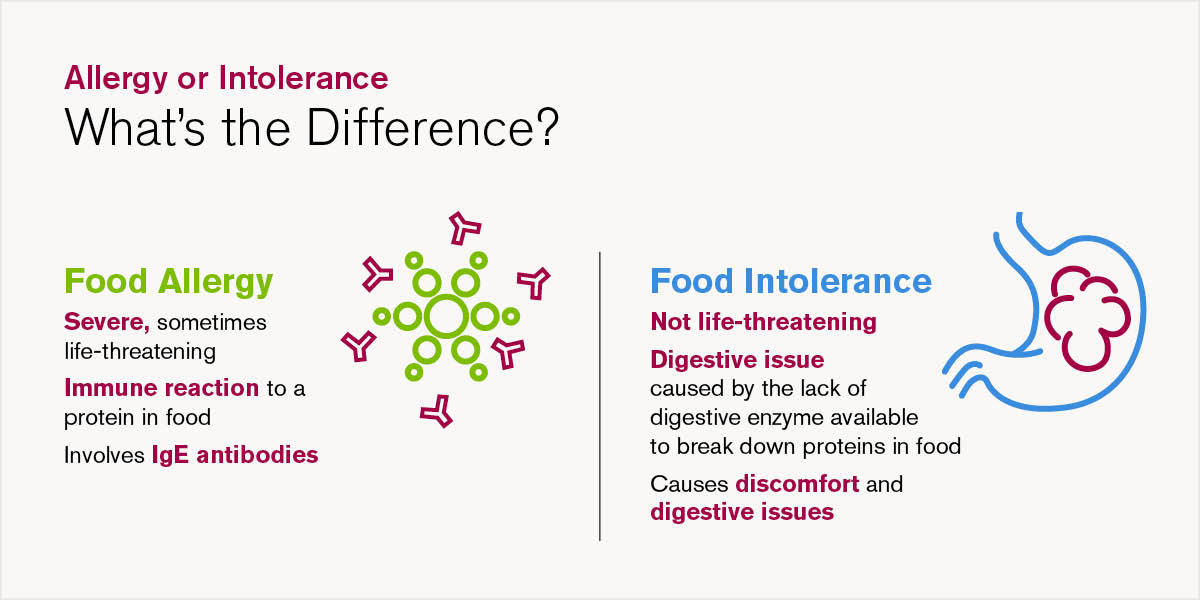5 Things to Know About Food Allergies in Children
October 16, 2023
Categories: Pediatrics, Allergy & Immunology

Food allergies are fairly common. A food allergy occurs when your child's immune system has an adverse response to a certain food. It sends antibodies to "attack" the food, believing it to be a dangerous substance. This causes the release of histamines and other chemicals that cause hives, asthma, itching and other symptoms.
It's currently estimated that 1 in 13 children have a food allergy, and more than 40% have experienced a severe reaction. Loyola Medicine understands that, as a parent, it can be nerve-wracking and confusing trying to understand everything about food allergies.
Joyce Rabbat, MD, FAAAAI, FACAAI, FAAP, FACDS, Division Director of Pediatric Allergy and Immunology and Associate Professor of Medicine and Pediatrics at Loyola, shares important information every parent should know when it comes to food allergies in children. "By following some practical guidelines, your child can live a normal, safe and healthy life,” says Dr. Rabbat.
Most children are allergic to the same foods
While almost any food or food additive can cause an allergic reaction, there are a few that cause 90% of all allergies. These include:
- Milk
- Eggs
- Wheat
- Soy
- Tree nuts
- Peanuts
- Fish
- Shellfish
- Sesame
Out of these foods, eggs, milk and peanuts are by far the most common among young children.
Despite the initial shock of discovering your child has one or more food allergies, try not to be too discouraged. You may not need to be as incredibly strict with their diet as you think. For example, if your child is allergic to peanuts, many children won't have to avoid foods labeled with the catch-all phrase, "manufactured in a facility that produces peanuts," or similar.
"Precautionary labeling of foods, such as 'may contain' or 'processed at a facility that also produces a certain allergen' can be very challenging for families," says Dr. Rabbat. "Having a precautionary label is not required by law, nor is it standardized. That being said, many children do not need to avoid such foods. Asking this question of your child’s allergist can help you navigate this. Being able to consume these foods opens up a lot of flexibility with prepacked foods."
A food allergy is not the same thing as food intolerance
You may have heard these two terms – food allergy and food intolerance – and thought they were one and the same. However, they are different conditions and a food intolerance is much more common than a food allergy.
The main difference between the two is that a food allergy involves the immune system producing allergic antibodies to a food, while an intolerance doesn't. This usually means that an intolerance has less severe symptoms and a child would not be at risk for anaphylaxis.
Some symptoms of food intolerance can be diarrhea, abdominal pain, heartburn, headaches, or gas and bloating.
Some common causes of an intolerance are:
- A missing enzyme that helps to digest food
- Irritable bowel syndrome, which can cause cramping and constipation
- A sensitivity to food additives.

Children can outgrow food allergies
While many parents believe food allergies to be a lifelong condition, that's not necessarily the case. When a food allergy develops during infancy or as a young child, many children are able to outgrow certain ones. Here are some encouraging statistics:
- An estimated 80% of children will outgrow their allergy to wheat
- About 79% of children will outgrow their allergy to cow's milk
- Roughly 68% of children will outgrow their egg allergy.
Unfortunately, despite peanuts being a common food allergen, children are unlikely to outgrow that allergy, although it is possible.
However, if you believe your child has outgrown a food allergy, don't suddenly reintroduce those foods.
"Before reintroducing a food that previously caused an allergic reaction, speak with an allergist who will take a thorough history and most likely perform a skin test," says Dr. Rabbat. “These tests can help with risk-stratification, and determine if it’s safe to reintroduce the food. At the time of reintroduction, your doctor may allow you to introduce it at home, or introduce via a supervised oral food challenge in the office, depending on the risk of a reaction.”
There is no right age for your child to be tested for food allergies
Many parents who worry about food allergies want their child to be tested as soon as possible. After all, if they can learn what foods to avoid, that's one more thing to not worry about, right? Not exactly.
"Allergy testing is not perfect. Testing should be used to confirm a suspected allergy, rather than to try to discover one," says Dr. Rabbat. “Unfortunately, we often see false-positive test results to foods, which can over diagnose the problem. Doctors should be judicious in which tests are merited given the child’s history so as not to create more confusion, and possibly delay introducing foods unnecessarily.”
For the most part, exposure history should be regarded above everything else. If you give your child a peanut and they have no symptoms, they are almost certainly not allergic. On the other hand, if they do have a reaction, even if mild, they should be evaluated.
The latest guidelines from the North American Allergy Societies recommend parents start introducing potential food allergens between 4 and 6 months old. A variety of allergens should be given regularly, and parents should not avoid possible allergens to try and prevent an allergy.
Warning signs of food allergies
When you give your child a potential allergen, watch for these symptoms:
- A rash or hives
- Swelling of the lips, tongue or throat
- Repetitive vomiting
- Difficulty swallowing
- Sudden itching
- Wheezing or trouble breathing
These symptoms will typically be obvious, not subtle. If any of these symptoms appears, contact a healthcare provider.
Why choose Loyola Medicine for allergy treatment?
At Loyola, you can rest assured that your child will receive the best allergy treatment possible. The Division of Allergy and Immunology at Loyola has one of the most comprehensive and advanced teams in the nation, with offices conveniently located throughout Chicago’s western suburbs.
To make an appointment, call 888-584-7888 or schedule an appointment online.
Joyce Rabbat, MD, FAAAAI, FACAAI, FAAP, FACDS is the Division Director of Pediatric Allergy and Immunology and an Associate Professor of Internal Medicine and Pediatrics at Loyola University Medical Center. She completed her residency and fellowship training at Rush University Medical Center. Under Dr. Rabbat's care, Loyola was recognized as a Clinical Care Center of Distinction by the Food Allergy Research and Education (FARE) Clinical Network.
Dr. Rabbat is passionate about helping children with allergies. She loves having long-term relationships with patients. Shared decision making is a top priority for Dr. Rabbat, providing education and guidance to patients while working with them to determine what is best for them.
Book an appointment today to see Dr. Rabbat or another Loyola provider by self-scheduling an in-person or virtual appointment using myLoyola.
